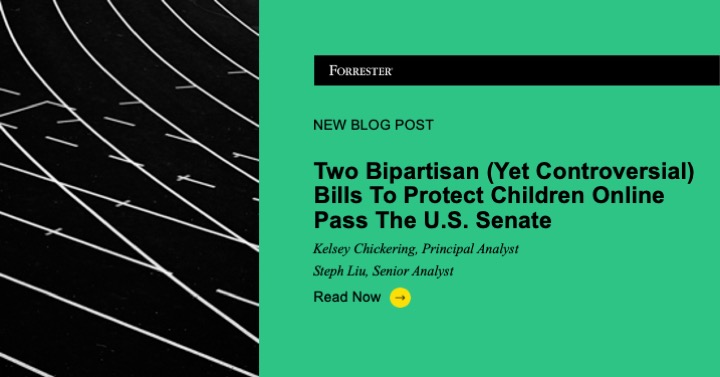In overwhelming (and very rare) bipartisan agreement, the United States Senate passed two bills that tackle children’s online safety: the Kids Online Safety Act (KOSA) and the Children’s and Teens Online Privacy Protection Act (COPPA 2.0). This is a big deal because the Senate hasn’t passed internet protections for kids in decades. But the two bills still need the approval of the U.S. House of Representatives before President Biden considers signing them into law.
KOSA and COPPA 2.0 each focus on putting more explicit protections in place for minors across the internet. KOSA will make social media companies more accountable for protecting minors on their platforms — including safety controls for parents/guardians, algorithm transparency, and mental health impact assessments. COPPA 2.0 strengthens existing online privacy protections for children — including (but not limited to) an expanded age range (from 13 to 16), a ban on targeted advertising, and data transparency requirements.
Consumers Think Parents – Not The Government – Should Take The Lead On Safety
Social media platforms have been under pressure for months for their failure to protect children. However, results from Forrester’s March 2024 Consumer Pulse Survey show that US online adults have mixed feelings about provisions for minors on social media. Most respondents think social media does more harm than good for teenagers, but nearly three quarters believe parents, not the government, are responsible for monitoring their children’s social media use. In fact, 67% would support a law that requires parental consent for minors to create new social media accounts.
Teenagers Say They’re Savvier Than The Senate Gives Them Credit For
While COPPA 2.0 is seen as a needed update to an existing privacy law, KOSA is facing much more backlash and criticism. The main concern is that this legislation gives platforms too much power to decide what’s harmful to minors. Over 300 high school students showed up to urge lawmakers to vote “no” against the KOSA legislation, arguing that KOSA would stifle free speech online and would hinder their ability to gain access important information and share their perspective on topics platforms consider to be decisive.
Teens also argue that they are more sophisticated in matters of the internet than lawmakers might think. In fact, Forrester’s Youth Survey, 2023, found that US youth (ages 12-17) are mindful about their online behavior:
-
- 60% indicate they keep careful track of the information they put on social media
- 64% indicate they’re aware their information and activities are collected by websites and apps they use
- 46% indicate they take active measures to limit the collection of my personal information by apps and websites
These Provisions Could Do More Harm Than Good
Social media platforms have tried – and repeatedly failed – to moderate their own content effectively. KOSA would up the ante, applying not just to social media platforms, but also “any online platform that connects to the internet and that is used, or reasonably likely to be used, by a minor.” Applying these sweeping requirements across the internet landscape seems tactically impossible. While most agree there must be privacy protections for children, privacy advocates such as the EFF oppose KOSA because:
- KOSA creates censorship requirements. Online platforms that fall under this law would need to filter their content so heavily, it would also impact how much information even adults are able to access. Additionally, minors who don’t have access to information that could actually help them – in school or in their homes – could lose access completely. As the EFF puts it, “There is no realistic way to find and filter only that content without also removing a huge swath of content that is beneficial.”
- Age-gating will kill anonymity. To ensure minors don’t access certain content, many of these platforms might resort to age-gating that content, which would require an age verification system. That level of verification across the internet would require minors and adults alike to hand over private data, which not only harms privacy but also creates security risks. The US government has already faced backlash and complaints over a facial recognition system, and an identity verification service used by TikTok and other apps exposed consumers’ sensitive data earlier this year.
Protecting children’s privacy is important work. We’ve seen a string of COPPA-related fines and settlements in recent years, impacting companies like Amazon, Microsoft, and Facebook. However, KOSA introduces a bevy of new requirements that companies aren’t equipped to handle, and may inadvertently create additional privacy harms in the process.
Forrester clients: Let’s talk more about this topic via a Forrester guidance session.








